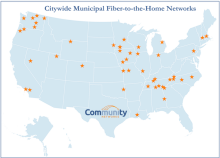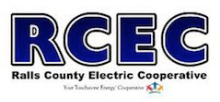New Resource: Map, List Of Citywide FTTH Munis
It’s no small feat to plan, deploy, and operate a municipal citywide Fiber-to-the-Home (FTTH) network, but communities are doing it. We’ve put together a Citywide Municipal FTTH Networks list and a map, with quick facts at your fingertips. If your community is considering such an investment, this list can offer a starting point on discovering similarly situated locations to study.
The list is divided by state and each state heading offers a description of any barriers that exist and a link to the statute in question. Under each community, we also included relevant links such as to the provider’s website, coverage on MuniNetworks.org, and reports or resources about the network.
We used four basic criteria to put a community on our list and map:
- The network must cover at least 80% of a city.
- A local government (city, town, or county) owns the infrastructure.
- It is a Fiber-to-the-Home network.
- It is in the United States.
Share the list far and wide and if you know of a community network that meets our criteria that we missed, please let us know. Contact H. Trostle at htrostle@ilsr.org to suggest additions.








